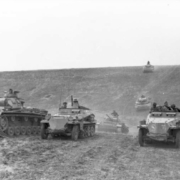Blitzkrieg
Blitzkrieg is a German language term used to describe fast-moving, mechanised attack warfare, as originally practised by Germany early in the 1939-45 Second World War. Blitz means lightning and Krieg means war, so this is a lightning strike to overcome the enemy, as Germany did in France in 1940. Lightning War, also called at the time Bewegungskrieg, meant a sudden attack with an overwhelming force of combined air, artillery, armour and ground troops with radio communication, bringing the latest technology into play and making it hard for the opponent to react in time. This was very much in contrast to the static, trench- based warfare of most of the 1914-18 First World War.
The term is now widely used to describe rapid, overwhelming attacks. Interestingly the famous Roman general and later dictator Julius Caesar was famous for surprising and defeating his enemies by arriving early at likely battle sites after putting his men through many days of forced marches, and is sometimes seen as an early practitioner of Blitzkrieg.




